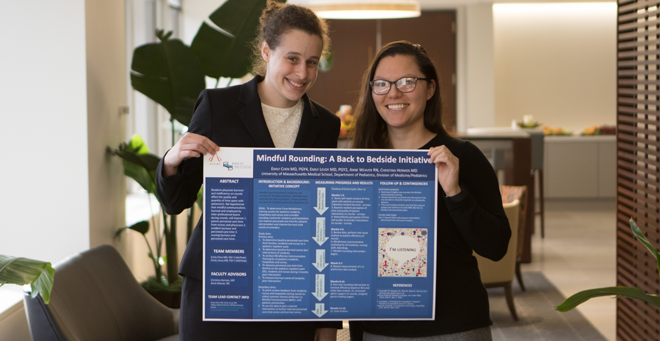 |
|
|
Emily Levoy, MD, (left) and Emily Chen, MD, with a poster detailing their grant |
The American Council of Graduate Medical Education has awarded a Back to Bedside grant to UMass Medical School alumni and internal medicine/pediatrics residents Emily Chen, MD, SOM ’14, and Emily Levoy, MD, SOM ’16. The Back to Bedside program supports resident- and fellow-led projects that affect the way they engage with patients and their learning environment in powerful and meaningful ways. Drs. Chen and Levoy will use the one-year, $2,000 grant to implement their “Mindful Rounding: A Back to Bedside Initiative.” The grant is renewable for up to two years.
“The majority of residents enter the medical field because we enjoy interacting with and helping patients, but many of us have found that we devote too much time to administrative tasks and documentation,” said Levoy. “The Back to Bedside grant was a great opportunity to think critically about how we could create an intervention to improve the quantity and quality of the interactions we have with patients and families on a busy inpatient pediatrics ward.”
Mindful communication in medicine is the concept of bringing intention, attention and reflection to clinical practice. It has shown promise as a way to combat physician burnout. Their model, if successful, would be an additional tool for the care team to use with both patients and staff, increasing interprofessional collaboration.
Levoy and Chen will conduct a training workshop on mindful communication followed by incorporating daily mindfulness activity. Mindful rounds will be structured to begin with a brief meditation, and the care team will set an intention before each new patient is presented to encourage team members to stay present throughout the encounter. They will survey participating residents, hospitalist attending physicians and pediatric nurses to determine if the intervention improves the perception of quality of time with patients.
“We hope that our project will create opportunities for residents, faculty and nurses in the pediatrics department to learn and experience mindfulness and mindful communication in medicine, and simultaneously improve patient and family satisfaction with the care they receive at our institution,” Chen said. “We hope that teaching mindful communication skills and reinforcing them with frequent recentering exercises will bring meaning back into patient interactions, reconnecting us with why we got into medicine in the first place.”
With its mission to improve health care and population health by assessing and advancing the quality of resident physician education through accreditation, the ACGME serves thousands of residency and fellowship programs and the institutions that sponsor them. Its Council of Review Committee Residents designed the Back to Bedside initiative to empower residents and fellows to develop transformative projects that combat burnout by fostering meaning in their learning environments and engaging on a deeper level with their patients.
Chen and Levoy would eventually like to expand the mindfulness rounding intervention to other departments at UMass Memorial hospitals. “We are hoping our project will allow our patients to feel heard and understand, creating connections that can be healing in themselves, for both patients and providers,” they concluded.